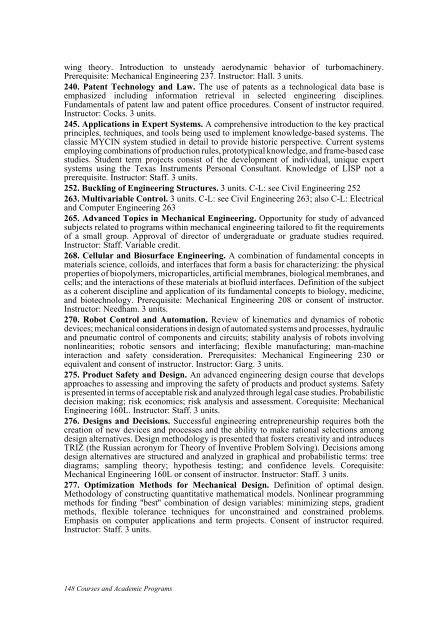2005-06 - Office of the Registrar - Duke University
2005-06 - Office of the Registrar - Duke University
2005-06 - Office of the Registrar - Duke University
You also want an ePaper? Increase the reach of your titles
YUMPU automatically turns print PDFs into web optimized ePapers that Google loves.
wing <strong>the</strong>ory. Introduction to unsteady aerodynamic behavior <strong>of</strong> turbomachinery.<br />
Prerequisite: Mechanical Engineering 237. Instructor: Hall. 3 units.<br />
240. Patent Technology and Law. The use <strong>of</strong> patents as a technological data base is<br />
emphasized including information retrieval in selected engineering disciplines.<br />
Fundamentals <strong>of</strong> patent law and patent <strong>of</strong>fice procedures. Consent <strong>of</strong> instructor required.<br />
Instructor: Cocks. 3 units.<br />
245. Applications in Expert Systems. A comprehensive introduction to <strong>the</strong> key practical<br />
principles, techniques, and tools being used to implement knowledge-based systems. The<br />
classic MYCIN system studied in detail to provide historic perspective. Current systems<br />
employing combinations <strong>of</strong> production rules, prototypical knowledge, and frame-based case<br />
studies. Student term projects consist <strong>of</strong> <strong>the</strong> development <strong>of</strong> individual, unique expert<br />
systems using <strong>the</strong> Texas Instruments Personal Consultant. Knowledge <strong>of</strong> LISP not a<br />
prerequisite. Instructor: Staff. 3 units.<br />
252. Buckling <strong>of</strong> Engineering Structures. 3 units. C-L: see Civil Engineering 252<br />
263. Multivariable Control. 3 units. C-L: see Civil Engineering 263; also C-L: Electrical<br />
and Computer Engineering 263<br />
265. Advanced Topics in Mechanical Engineering. Opportunity for study <strong>of</strong> advanced<br />
subjects related to programs within mechanical engineering tailored to fit <strong>the</strong> requirements<br />
<strong>of</strong> a small group. Approval <strong>of</strong> director <strong>of</strong> undergraduate or graduate studies required.<br />
Instructor: Staff. Variable credit.<br />
268. Cellular and Biosurface Engineering. A combination <strong>of</strong> fundamental concepts in<br />
materials science, colloids, and interfaces that form a basis for characterizing: <strong>the</strong> physical<br />
properties <strong>of</strong> biopolymers, microparticles, artificial membranes, biological membranes, and<br />
cells; and <strong>the</strong> interactions <strong>of</strong> <strong>the</strong>se materials at bi<strong>of</strong>luid interfaces. Definition <strong>of</strong> <strong>the</strong> subject<br />
as a coherent discipline and application <strong>of</strong> its fundamental concepts to biology, medicine,<br />
and biotechnology. Prerequisite: Mechanical Engineering 208 or consent <strong>of</strong> instructor.<br />
Instructor: Needham. 3 units.<br />
270. Robot Control and Automation. Review <strong>of</strong> kinematics and dynamics <strong>of</strong> robotic<br />
devices; mechanical considerations in design <strong>of</strong> automated systems and processes, hydraulic<br />
and pneumatic control <strong>of</strong> components and circuits; stability analysis <strong>of</strong> robots involving<br />
nonlinearities; robotic sensors and interfacing; flexible manufacturing; man-machine<br />
interaction and safety consideration. Prerequisites: Mechanical Engineering 230 or<br />
equivalent and consent <strong>of</strong> instructor. Instructor: Garg. 3 units.<br />
275. Product Safety and Design. An advanced engineering design course that develops<br />
approaches to assessing and improving <strong>the</strong> safety <strong>of</strong> products and product systems. Safety<br />
is presented in terms <strong>of</strong> acceptable risk and analyzed through legal case studies. Probabilistic<br />
decision making; risk economics; risk analysis and assessment. Corequisite: Mechanical<br />
Engineering 160L. Instructor: Staff. 3 units.<br />
276. Designs and Decisions. Successful engineering entrepreneurship requires both <strong>the</strong><br />
creation <strong>of</strong> new devices and processes and <strong>the</strong> ability to make rational selections among<br />
design alternatives. Design methodology is presented that fosters creativity and introduces<br />
TRIZ (<strong>the</strong> Russian acronym for Theory <strong>of</strong> Inventive Problem Solving). Decisions among<br />
design alternatives are structured and analyzed in graphical and probabilistic terms: tree<br />
diagrams; sampling <strong>the</strong>ory; hypo<strong>the</strong>sis testing; and confidence levels. Corequisite:<br />
Mechanical Engineering 160L or consent <strong>of</strong> instructor. Instructor: Staff. 3 units.<br />
277. Optimization Methods for Mechanical Design. Definition <strong>of</strong> optimal design.<br />
Methodology <strong>of</strong> constructing quantitative ma<strong>the</strong>matical models. Nonlinear programming<br />
methods for finding ''best'' combination <strong>of</strong> design variables: minimizing steps, gradient<br />
methods, flexible tolerance techniques for unconstrained and constrained problems.<br />
Emphasis on computer applications and term projects. Consent <strong>of</strong> instructor required.<br />
Instructor: Staff. 3 units.<br />
148 Courses and Academic Programs









